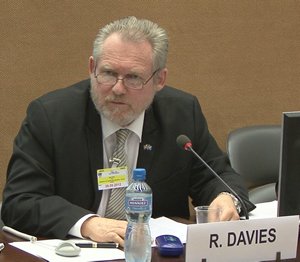Minister Davies said a “profound shift” occurring in the global economy with the growing centrality of developing countries in driving global economic growth, appears also to promise growing foreign direct investment in Africa.
“These global changes have been accompanied by significant improvements in Africa’s economic prospects,” Minister Davies said. “Africa is already the second fastest growing continent in the world, after Asia, and offers the highest return on investment of any region.”
 The challenge, Minister Davies stressed, “is to move off an economic growth path built on consumption and commodity exports onto a more sustainable developmental path based on industrialization.” He said such an approach should include improvements in infrastructure so that African countries can successfully host new and more sophisticated forms of industry. It also should include increased regional and intra-African economic cooperation and trade.
The challenge, Minister Davies stressed, “is to move off an economic growth path built on consumption and commodity exports onto a more sustainable developmental path based on industrialization.” He said such an approach should include improvements in infrastructure so that African countries can successfully host new and more sophisticated forms of industry. It also should include increased regional and intra-African economic cooperation and trade.
Foreign direct investment (FDI) should be considered by African countries based on an “investment for sustainable development model (ISD)” instead through a “freedom of investment model,” he recommended. The freedom of investment approach, which has prevailed in recent years, “tends to assume that all investment is good, and that all investment promotes development. . . By contrast, the ISD approach recognizes that while FDI can make a positive contribution to sustainable development, the benefits to host countries are not automatic.”
“It posits that regulations are needed to balance the economic requirements of investors with the need to ensure that investments make a positive contribution to sustainable development in the host state.” Such an approach aims to use investment to advance such associated benefits as technology transfer, skills development, research, and establishing local economic linkages. Such connections “need to be purposefully built into the investment regime, and not taken for granted,” Minister Davies said.
He said South Africa is shifting to an ISD approach and is carefully reviewing its investment decisions – and those bilateral investment treaties it signed in the past which are now reaching their termination dates – “to achieve an appropriate balance between the rights and obligations of investors and the need to provide adequate protection of foreign investors, while insuring that Constitutional obligations are upheld and that the government retains the policy space to regulate in the public interest.”
Minister Davies praised "the unique leadership UNCTAD provides in development policy thinking" and concluded by saying that UNCTAD's new Investment Policy Framework for Sustainable Development (IPFSD) offers a strong point of departure for international cooperation in the area of international investment policy-making.
He urged UNCTAD to provide “a transparent and inclusive platform for wide-ranging inter-governmental consultations on investment policy,” and to continue to play its unique role as the focal point in the UN system for the consideration of the interrelated issues of trade, investment, finance and technology from the development perspective.


